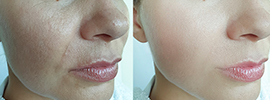One skin concern that has plagued most of us at some time or the other is uneven skin. Whether this is due to acne scars, large pores, or hyperpigmentation, microneedling has proven to work wonders! Here are some things you would want to know, however, before setting up an appointment for microneedling near you.
1. Am I the right candidate for microneedling?
Before you run a google search for ‘microneedling near me’, you should be asking yourself: Is microneedling the right skin treatment for me? Skin conditions that can benefit the most from microneedling include the following:
- Acne scars or traumatic facial scars
- Hyperpigmentation and melasma
- Uneven skin tone and texture, including large pores
- Fine lines and small wrinkles
- Stretch marks
If you have one of the above conditions, you should consider getting microneedling. However, if you have active acne or skin infections, or you are looking to treat deep wrinkles, this treatment may not be your best choice.

2. How does microneedling work?
The procedure uses tiny needles, which are roughly the diameter of a single hair strand. These needles puncture the outermost layer of your skin, essentially creating microinjuries. These injuries boost the production of collagen, a vital skin protein that helps heal and transform skin texture.
3. Do I need to take any precautions prior to microneedling?
It is better to avoid cosmetic creams prior to your appointment. Some of these creams can contain retinol, or other harsh chemicals that can sensitize the skin to the microneedling process. Stop using creams at least 48 hours prior to the procedure. It would also be advisable to avoid sun exposure for three days prior to the procedure; this could also sensitize your skin.
4. What can I expect during the microneedling treatment?
Initially, the esthetic medicine specialist will use a numbing cream on the area of your skin that is to undergo microneedling. Tis will begin to show efficacy in about half an hour, after which the microneedling process begins. The esthetician performing the procedure simply runs a microneedling device, which is shaped like a pen, across your face. The device makes regular stamping motions into your skin. After the procedure, you may receive a serum or a face mask to soothe your skin. Overall, the entire treatment process takes an hour or less from start to finish. There is absolutely no downtime required, and you can resume your regular activities right away. You will need to avoid cosmetic creams or sun exposure for three days after the procedure as well, as your new, exposed skin is more sensitive to these.
5. How much does microneedling treatment cost?
The overall cost of microneedling would depend on the area where you live, and the number of sessions that you would require. In Boston, the cost of a single session of microneedling is $399. This cost may increase if microneedling is combined with other procedures.
6. Can microneedling ruin your skin?
Microneedling does not ruin your skin – instead, the microinjuries caused boost healing and refine the skin. However, like any other skin treatment, microneedling comes with its share of side effects, which include the following:
- You may notice some bleeding points – this is due to the needle pricks and is perfectly normal. These help with the healing process.
- Your skin can feel raw and look reddish – like you have a sunburn
- You may notice some swelling and tightness of the skin.
- Your skin may become dry and flaky – it is important to keep it well moisturized after the procedure
7. Are there any contraindications to microneedling?
If you have certain local skin conditions, your esthetic specialist may want to avoid microneedling in those areas of your face or body. These include keloid scars, raised moles and active eczema. Certain medical conditions are also a contraindication to microneedling. These include diabetes, a history of herpes simplex, psoriasis and other clotting conditions. You should not consider microneedling under any circumstances if you have blood clotting disorders, or any collagen and vascular disorders. Pregnant and nursing mothers should also delay treatment until nursing is stopped.
If you live in Natick, Boston, finding the right microneedling center near you is not a problem! At Evolution MedSpa, our microneedling procedures are overseen by our Harvard trained, board certified esthetic medicine specialists. You will receive a comprehensive skincare consultation beforehand, where our doctors will discuss your skin concerns and treatment goals with you, and help you determine whether microneedling is the right way to go. To schedule a comprehensive consultation with our cosmetic specialists, you can call 617-915-2055.

Recent Comments